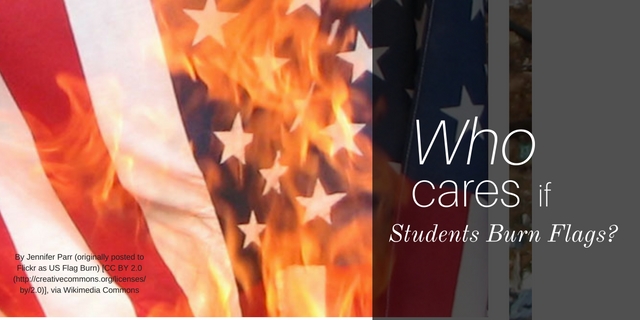What would you think if someone burned the American flag on your campus? Fortunately, most college administrations understand this action is protected by the first amendment, but not by the Fire Marshall.
Flag Burning as a Form of Political Speech
International students who come from countries with stricter censorship laws fail to understand the concept of flag burning being protected as free speech in the United States. To them, this act is a blatant symbol of disrespect.
Equally, many Americans are unable to appreciate the historical importance of free speech, and how the protection offensive language and behavior is integral to shaping democracy.
Perhaps if more people understood that the Star Spangled Banner’s lyricist, Francis Scott Key, was a racist, an active anti-abolitionist, a slave-owning District Attorney, and that John Stafford Smith’s “Anacreon” – a salacious British drinking song – was used for the melody, they may not be so preoccupied with Colin Kaepernick’s choice of expression.
The debate over Flag Burning
More importantly, let’s not forget that the working poor and minorities of all persuasions have suffered terribly under our flag’s promise of freedom and justice ever since the first one had flown. To many the American flag represents freedom. To others, it’s a symbol of oppression. But many would agree that without the right to dissent, the debate over burning the flag would be meaningless.


Crazy people do crazy things.
I think it is unlawful burning any country’s flag. It is disrespectful, and should not be allowed as a form of political language.
You are entitled to your belief but it is U.S. proposed law here to allow burning flag as a form of political speech.